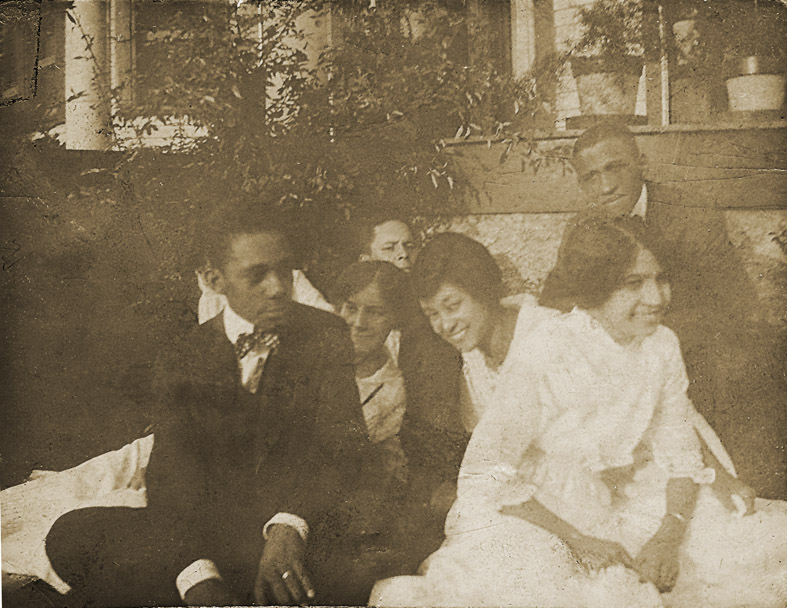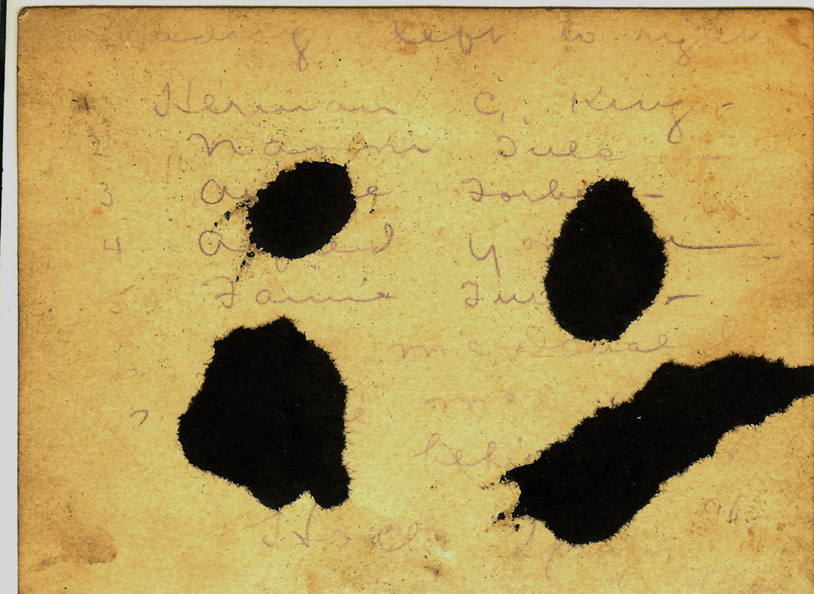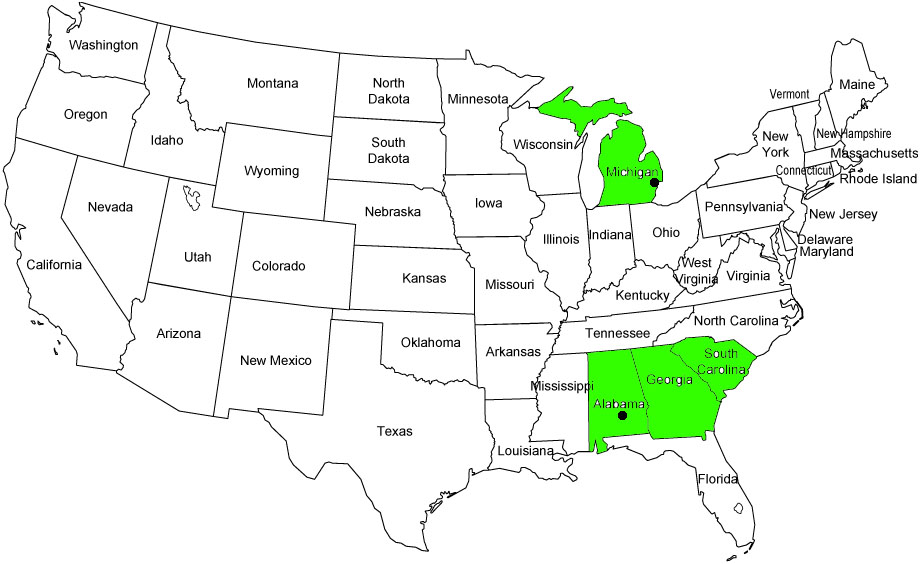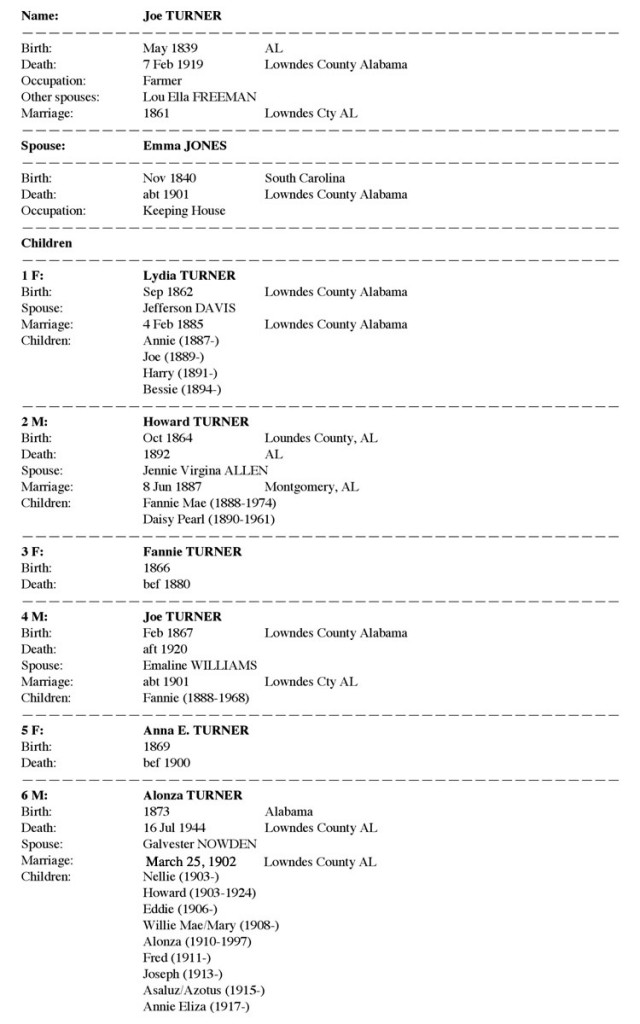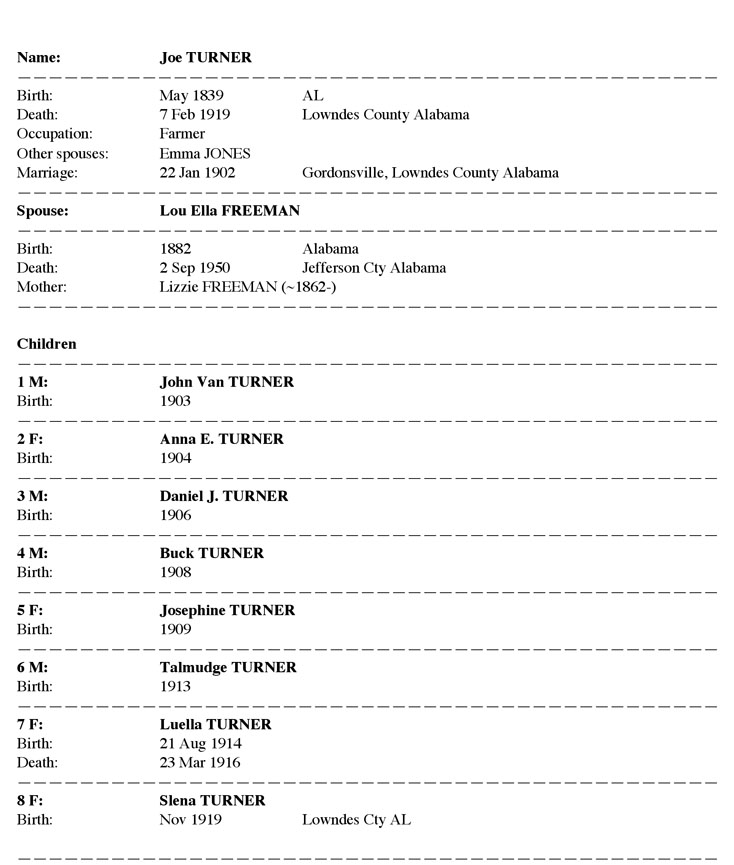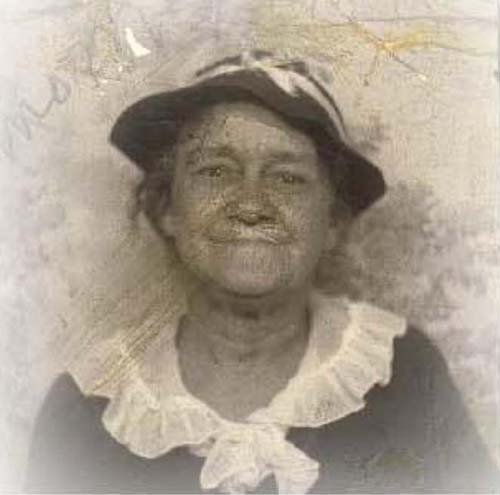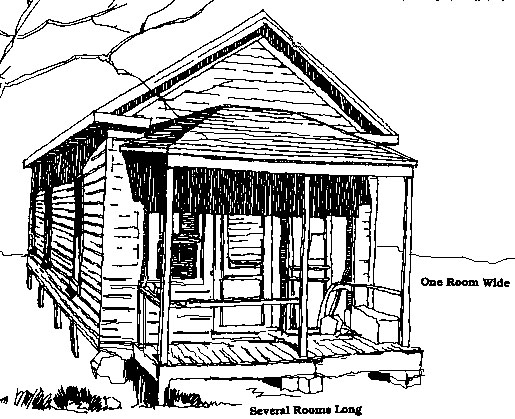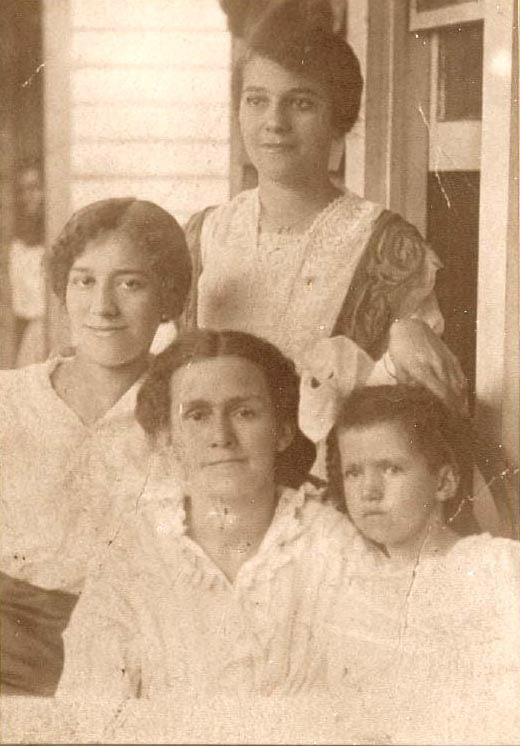Reading left to right
1. Herman C. King
2. Naomi Tulane (my grandmother’s cousin)
3. A??? Forbes
4. Alfred Young (?)
5. Fannie Turner (my grandmother)
6. ??? McDonald
7. ?? McDonald
???? behind
Holly Springs
Category Archives: Turner
From Montgomery to Detroit
Dock Allen was born around 1832 into slavery in Georgia. He died free in 1909 in Montgomery Alabama. He was a carpenter. His mother, Matilda Brewster was born in Georgia into slavery. I don’t know when or where she died.
Eliza Williams Allen was born into slavery about 1839 in Alabama. She died free in Montgomery Alabama in 1917. She was a seamstress. Her mother, Anne Williams was born into slavery in South Carolina about 1820 and died free in Montgomery before 1900.
Dock and Eliza’s daughter Jennie Virginia Allen Turner was born in Montgomery, Alabama in 1866. She was a seamstress. She died in 1954 in Detroit, Michigan. In 1887 she married Howard Turner. He was born in Lowndes County Alabama in 1864. He was murdered in Alabama in 1892. His father, Joe Turner, was born into slavery in Alabama about 1839. He was a farmer. He died free in Alabama in 1919. Howard’s mother, Emma Jones, was born into slavery in South Carolina about 1840 and died free in Alabama in 1901.
Jennie and Howard’s daughter, Fannie Turner Graham was born in Lowndes County, AL in 1888. She died in Detroit, Michigan in 1974. She managed a grocery store before her marriage to Mershell C. Graham in 1919. Mershell and both of his parents were born in Alabama. Mershell moved to Detroit, Michigan in 1918. In 1919 he returned to Montgomery to marry Fannie. They both returned to Detroit immediately following the wedding where they roomed with friends from Montgomery for several years. Mershell worked at Fords Motor Co. in the parts section. When they were ready to buy their own house they sent for Fannie’s mother, Jennie and two sisters. All of Fannie and Mershell’s children were born in Detroit. In 1946 Fannie’s Aunt Abbie came up from Montgomery and lived with Mershell and Fannie until her death in 1966.
By the 1960s all of Dock and Eliza’s children and grandchildren had left Montgomery and were living in Detroit, Michigan; Chicago, Illinois; Madison, Wisconsin and New York City. Mershell’s relatives remained in Alabama but contact was lost and we don’t know what happened to them. Joe and Emma’s children stayed in Lowndes County, some moving to Montgomery and Birmingham by the 1930 census. Because my grandmother lost touch with them before leaving Alabama I only know by following the census where they went. I believe some eventually moved to Chicago but I’ll have to wait for the 1940 census to verify.
My cousins and I grew up in Detroit surrounded by family on both sides, who had left Alabama, Kentucky and Tennessee to end up there. Of my grandparents five granddaughters, two remain in Detroit as do their children and grandchildren. One now lives in California where the majority of her children, grandchildren and great grandchildren were born and live. My sister and I, along with most of our children and grandchildren live in Atlanta Georgia.
A letter to my grandmother Fannie
Rents Collected Homes Bought Loans Negotiated And Sold
Estates Managed
Dear Fannie,
I am enclosing check from this M.R. & Ins. Co; for ten dollars which the sec’y should have mailed you some time ago.
We are winding up the affairs of this company and will send you another payment on stock acct. pretty soon. I think that the company will be able to pay off it’s stock holders dollar for dollar.
I trust this will find all well and getting along nicely.
Your mother’s things were shipped yesterday. Trust they will arrive on time and in first class condition. Remember me to all the folks. Tell the kids hello!
Let us have a line from you when convenient.
Your Uncle,
Victor
A Family Photograph – 1891
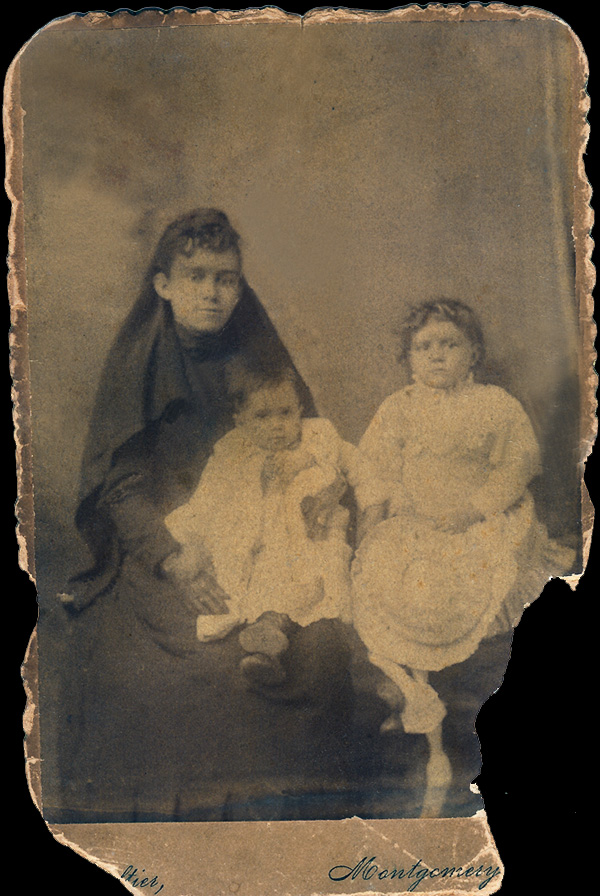
Howard Turner and Jennie Virginia Allen were married in June of 1887. Howard’s father, Joe Turner gave them land to farm in Lowndes County, Alabama. Joe wanted the land to stay in the family forever. By 1892 Joe and Howard were arguing constantly about Howard and Jennie’s desire to sell the land and move to Montgomery. The day of the fateful bar-b-que the arguments had been particularly violent. Jennie was in Montgomery visiting her parents , with their two young daughters, when word came that Howard had been shot dead at the bar-b-que.
Jennie moved back to her parent’s house with her children, Fannie and Daisy. She took the title to the land to a lawyer and asked him to make sure all was in order so she could sell. When she returned the lawyer told her that the title was not clear and she didn’t own the land. Jennie believed that her father-in-law had paid the lawyer to get the land back for himself. She cut ties with the Turners and went to work as a seamstress, the trade her mother Eliza had taught all six of her daughters.
Many years later, when Fannie was grown, she ran into one of her Turner cousins. She asked the cousin about what her mother believed – that Joe Turner had his son killed to keep the land. It wasn’t true. The lawyer had stolen the land for himself. They didn’t know who killed Howard.
Fannie was my maternal grandmother. Howard and Jennie were my great grandparents. Joe Turner was my great great grandfather. I didn’t know his or wife’s name, nor any of Howard’s siblings names until I found them in the 1870 and 1880 census in Lowndes County, Alabama when I began to do online research in the 1990s. Joe and Emma Turner lived on the farm with their children, Lydia b. 1862, Howard b. 1863, Fanny b. 1864, Joe b. 1867, Anna b. 1869, Alonza b. 1873.
My Great Grandmother’s Memory Book – 1884
I found my greatgrandmother’s autograph/memory book in an envelope in a box where my mother saved little notebooks, wallets etc. The first part of the book, including the cover have vanished. Going by what is left I think my greatgrandmother started the book when she was 19 years old.
Transcribed entries numbering from top left down column, over to second column, etc.
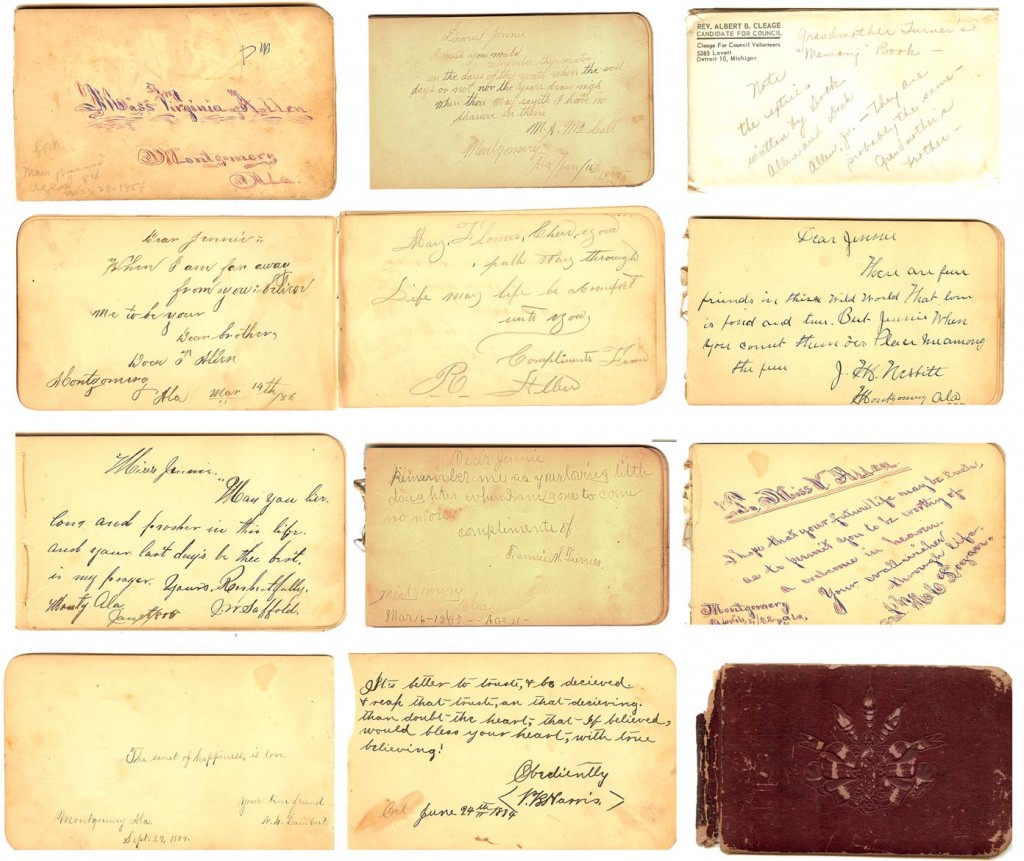
Miss Virginia Allen
Montgomery Ala.
Mom passed aged 84
Mar 28 1954
Dear Jennie
When I am far away
From you believe
Me to be your
Dear brother
Dock Allen
Montgomery Ala Mar 14th/86
Jennie’s brother, Dock, was born in 1862, four years before Jennie. He worked as an errand boy and a barber – he drowned in 1891 on Aug. 30 Trying to “walk the moonlight path.”
Miss Jennie
May you live long and prosper in this life
And your last days be the best
Is my prayer. Yours Respectfully,
J W Saffold
Montg Ala
Jan 7th 1886
The secret of happiness, is love
Your true friend
N.C. Lambert
Montgomery, Ala.
Sept. 29, 1884
Dearest Janie
I wish you would
Remember they creator
In the days of thy youth when the evil
Days are not nor the years draw nigh
When thou may sayeth I have no
Pleasure in them
M.A. McCall
Montgomery
Ala/Jan/16th 1885
May flowers cheer your
Path way through
Life may life be a comfort unto you
Compliments from
R. Allen
R. was Jennie’s brother Rance.
Dear Jennie
Remember me as your loving little
Daughter when I am gone to come
No more
Compliments of Fannie M. Turner
Montgomery Ala
Mar 16 – 1897 – Age 11
It’s better to trust and be deceived
and reap that trust, and that deceiving.
Than doubt the heart, that if believed
Would bless your heart, with true believing!
Obediently
V.B. Harris
June 24th 1884
Grandmother Turners
“Memory” Book –
Note the entries written by DockAllen and Dock Allen, Jr. – they are probably the same – grandmother’s brother
This was added years later by my mother, Jennie’s granddaughter.
Dear Jennie
There are few
friends in this wild world that love
is fond and true. But Jennie when you count them over, place me among the few
J. M. Nesbitt
Montgomery, Ala
To Miss V. Allen
I hope that your future live may be such,
As to permit you to be worthy of
A welcome in heaven.
Your well wisher
Through life
Montgomery
April 4/22 Ala
ThMC Logan
Emma and Joe Turner of Gordensville, Lowndes County, Alabama
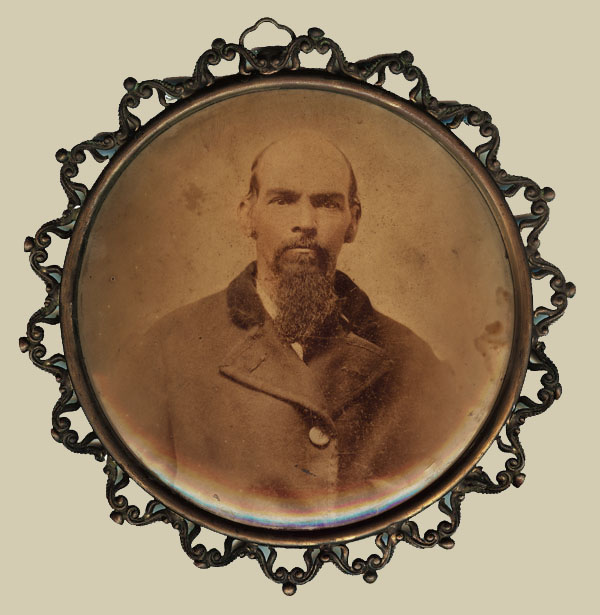
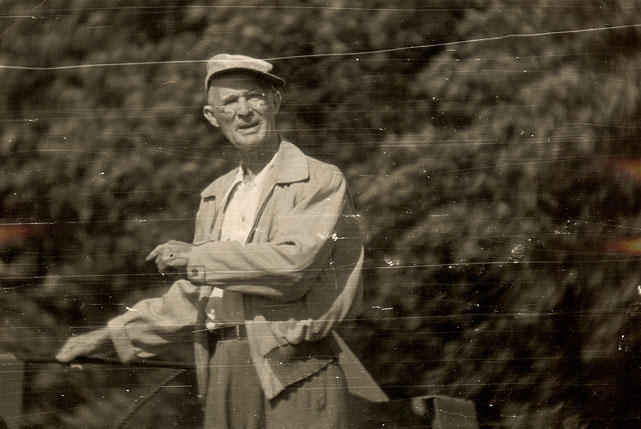
My grandmother Fannie Turner Graham’s father was named Howard Turner. She did not have a photograph of him but said he looked like her grandfather, Dock Allen and my grandfather, Mershell Graham. Both pictured above. When my grandmother was four, her father Howard was killed at a barbecue. Her parents, Howard and Jennie (Allen) Turner had been talking about selling their portion of the Turner land and moving to Montgomery. Howard and his father had an argument before the barbecue and my great grandmother, Jennie, believed that Howard’s father had him killed so that he could not sell the land. Jennie took the deed to a lawyer and asked him to look over the deed because she wanted to sell the land. When she returned he told her the title wasn’t clear and she didn’t own the land. She figured her father-in-law had gotten it back. Jennie moved back to her parent’s home in Montgomery with her children and went to work as a seamstress. You can read her story here. Years later, my grandmother met one of her cousins on the street and learned that her grandfather did not get the land after all and had not had her father killed. This is all the information I had.
When I began searching online all I knew about my Turners was that they lived in or near Hayneville, Alabama: that my great-grandfather owned his farm: that my great grandfather’s name was Howard and that he was born about 1864. The 1880 census was available with an all name index through Family Search and I found Howard Turner, age 16, living with his family in Hayneville. He was a clerk in a store. It was a very emotional moment to find my great, great grandparents names. Joe and Emma Turner. The family included Lydia 18 born about 1862, Howard 16, born about 1864, Joe age 13 and at school, Annie 11 and Alonza 7. Joe senior and Emma were listed as 39. Below is the family sheet for Joe and Emma Turner.
With this information I was able to find them on Ancestry in the 1870 census, which was indexed only by head of household at that time. They were enumerated In Hayneville Beat 1, Lowndes County. Emma was and her parents were born in SC. Joe was born in Alabama. Joe was a farmer with $300 worth of personal goods. Neither he nor his wife Emma could read or write. The children were Lydia, 8, Howard 7, Fannie 6, Joe 3 and Annie born in August of that year. Joe Turner is in the 1866 census with 5 in the family living in Lowndes County, AL. From son Joe’s death record I learned that Emma’s maiden name was Jones. Or so the informant said.
In 1900 Joe and Emma owned their farm. Two of their grandchildren, Anelyzor (Annie) and Joseph Davis were enumerated with them. Emma had given birth to 11 children and only three were still alive. Those three were Joe, Alonza and Lydia parent of the above Annie and Joe. They had been married 39 years, which would place their marriage during slavery.
Emma died soon after the 1900 census. Joe remarried in 1902 to Luella Freeman, 40 years his junior. They went on to have 8 children – John, Anna, Daniel, Buck, Josephine, Talmudge, Luella, and Selena who was born after Joe died February 7, 1919 of “prostatic trouble and old age.” Luella died in Chicago in July of 1977. I think, but I need to send for the death certificate to check. Below is the family sheet for Joe and Luella Turner.
Now I need to find estate records, a will…. something that will give me names and places. I want to look at land records too. And newspapers from Lowndes County, Hayneville from 1892 when Howard died. This means a trip to an archive. Something I have never done. I need to check something else too, in Mildred Brewer Russell’s book “Lowndes Court House” it says that Joe Turner was one of a number of “prominent Negro politicians” during reconstruction. I have yet to find anything else about this, such as what office he held. It would be great to meet some of Joe Turner’s other descendants too – hopefully with some photos and able to tell me where Moss cemetery is since it seems to be no where but on their death certificates. I picture a lonely, deserted place in the woods with no markers. Just sunken areas.
Jennie Virginia Allen Turner 1866 – 1954
You may be wondering when I am going to find Eliza. I decided to post the information in the order that I received it. We’ll get there eventually. Today I am posting another writing by my mother. I also posted the personal parts of the letter she wrote to give you some idea of my mother as a person.
5 Nov 1980
by Doris Graham Cleage
Dear Kris,
Election Day! Did you ever? Here is a joke that sums it up for me:
Man, traveling on horseback down a road toward a certain town, comes to a farmer working in a field. Just ahead was a fork in the road. The man hollered to the farmer, “Does it matter which road I take to _______, ” and he named his destination. “Not to me it don’t, ” said the farmer, who hardly looked up from his work.
You don’t get it? That’s OK. It gives us a good laugh every time we tell it.
Today I’m going to write about Grandmother. Grandmother Turner was born about 1872, (Note: she was actually born in 1866) nine years after the Emancipation Proclamation. Don’t know if she finished high school – but she did go. Her mother taught her to sew and it was a good thing she did because grandmother worked the rest of her life supporting herself and her children at sewing. That is, she worked after husband Howard Turner died. They married when she was about sixteen. Don’t know his age. He looked something like grandmother’s father and also like my father, mother said. He was a farmer’s son from around Hayneville, AL, but he preferred the big city – Montgomery. His father had three sons and planned to give each one a large share of the farm when they married. Howard and Jenny received their farm, but neither one liked the country. One day they were in Montgomery. He was at a Bar-B-Q. She was at her parents with their daughters, Fannie Mae, 4, and Daisy Pearl, 2. someone brought word that the had been shot dead. Apparently no one ever knew who did it, but mother always said grandmother thought his father had it done because he was angry that Howard would not farm and had even been talking about selling his part. The father did not want the land sold, but wanted it to stay in the family forever. (Bless his heart!). He and the son had had some terrible arguments before they left to come to the Bar-B-Q. I often wondered why he was there and grandmother wasn’t. She always seemed to like a good time.
I remember her laughing and singing and dancing around the house on Theodore. She was short, about five feet I guess, with brown eyes, thin dark brown hair that she wore in a knot. She was very energetic, always walking fast. She always wore oxfords, often on the wrong feet, and never had time to change them. We used to love to tell her that her shoes were on the wrong feet. (smart kids!)

She never did thing with us like read to us or play with us, but she made us little dresses. I remember two in particular she made me that I especially liked. My “candy-striped” dress – a red white and blue small print percale. She put a small pleated ruffle around the collar and a larger one around the bottom. I was about Deignan’s (note: that would have been about 5) size, I guess, and I really thought I was cool! The other favorite was an “ensemble” – thin, pale green material with a small printed blue green and red flower in it – just a straight sleeveless dress with neck and sleeves piped in navy blue – and a three – quarter length coat of the same material – also straight -with long sleeves and lapels – also piped in navy blue. She never used a pattern. Saw something and made it! She taught us some embroidery which she did beautifully but not often. She never fussed at us – never criticized – and I think she rocked me in the upstairs hall on Theodore when I was little and sick. The rocker Daddy made stood in that hall. I remember lots of people rocking in that chair when I was small.
Grandmother went to work when her husband was murdered – sewing for white folks – out all day fitting and sewing – and sewing all night – finishing while mother and Daisy stayed with their Grandfather Allen, who would tell on them when Grandmother came home and she would spank them. Mother said she remembered telling Daisy to holler loudly so Grandmother wouldn’t spank them hard or long and it worked!
Grandmother stayed single until she was about 37 or 38 when she married someone Mother hated – looked Italian, hardly ever worked. Liked a good time. Fathered Alice and left when she was very small. Somehow when mother spoke of him I had the feeling he would have like to have taken advantage of her. She was about 20 and had given up two college scholarships to stay and help Grandmother.
Sometimes after her husband’s death, Grandmother took the deed to the farm to a white lawyer. (was there any other kind?) and told him to sell it for her. He went to see it and check it out – told her to forget it – her title wasn’t clear, but he never gave the deed back and she figured he made a deal with her father-in-law.
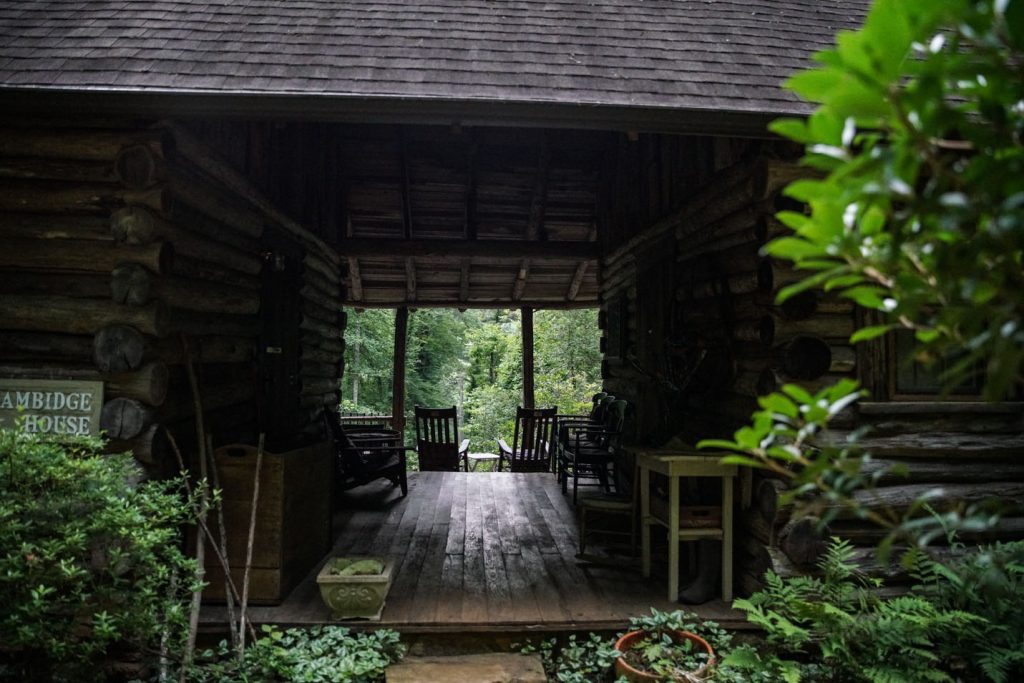
Aunt Abbie said the father-in-law built Grandmother and Howard a “shotgun” house on the farm. She would turn up her nose as she said it. You know that is a house like this – no doors on front or back, you could shoot a gun through hall without damage. Animals (pigs, dogs) would wander into the hall and have to be driven out. Aunt Abbie only stayed there when the plague was raging in Montgomery. Yellow fever (malaria) and/or polio every summer. Many people sick or dying. Huge bonfires in the streets every night to ‘purify’ the air”, and closing the city if it got bad enough – no one in or out. More than once they fled the city in a carriage through back streets and swamps because they were caught by the closing which was done suddenly to keep folks from leaving and spreading the “plague”
In Detroit, when they came in 1923 when Mother and Daddy had bought the house on Theodore and had room for them (room? only 5 adults and 3 children!) Grandmother, Daisy and Alice got good jobs, (they were good – sewing fur coats, clean work and good pay.) at Annis Furs (remember it back of Hudsons?) and soon had money to buy their own house much farther east on a “nice” street in a “better ” neighborhood (no factories) on Harding Ave. While they lived with us I remember violent arguments between Alice and I don’t know who – either Grandmother or Daisy or Mother. Certainly not Daddy because when he spoke it was like who in the Bible who said, “When I say go, they goeth. When I say come, they cometh.” Most of the time I remember him in the basement, the backyard or presiding at table. Daisy and grandmother were what we’d call talkers.
Maybe here a word about Aunt Daisy. Look at her picture, sweet, soft, pretty, taught school awhile in Montgomery (with high school diploma) loved Congregational preacher named Duncan Erby who loved her and waited for her for years. Had the church in Buffalo, NY. Whenever she really considered leaving, Grandmother did the old guilt trick “How can you leave me to take care of Alice all by myself?” and “No man in this world is good enough to touch your little finger. They are all no good except (maybe) Shell.” and Daisy listened and stayed and played numbers, studied dream books and drank a little apricot brandy. I always found their house light, cheerful, full of magazines (McCall’s, Journal, etc.) which I loved to read, full of good things to eat. All three were super cooks and they had always just had a bunch of friends to dinner and to play cards or just about to have.
Daisy took us downtown to the show every summer and to Saunders for ice cream afterward. And I always ended up with a splitting headache. Too much high living I guess. She and Alice would buy us dainty, expensive little dresses from Siegel’s or Himelhoch’s. They all went to church every Sunday, Plymouth Congregational. Daisy always gave us beautiful tins of gorgeous Christmas candy, that white kind filled with gooey black walnut stuff, those gooey raspberry kind and those hard, pink kind with a nut inside, and chocolates, of course! She loved to eat and to cook. Never seemed bitter or regretful about her lost love.
Grandmother got old, hurt her knee, it never healed properly. Daisy worked and supported the house alone. Alice only worked a little while. She had problems getting along with people. Grandmother was eventually senile. Died of a stroke at 83 or so. Alice spent years taking care of her while Daisy worked. Daisy added to their income by being head numbers writer at Annis!! Did I ever show you the picture of the “coloreds” who worked at Annis? Will send if you like. Looks like people from Mr. Polks book, were supposed to be the “best looking colored girls in Detroit” Mr. Annis had a colored mistress, of course.
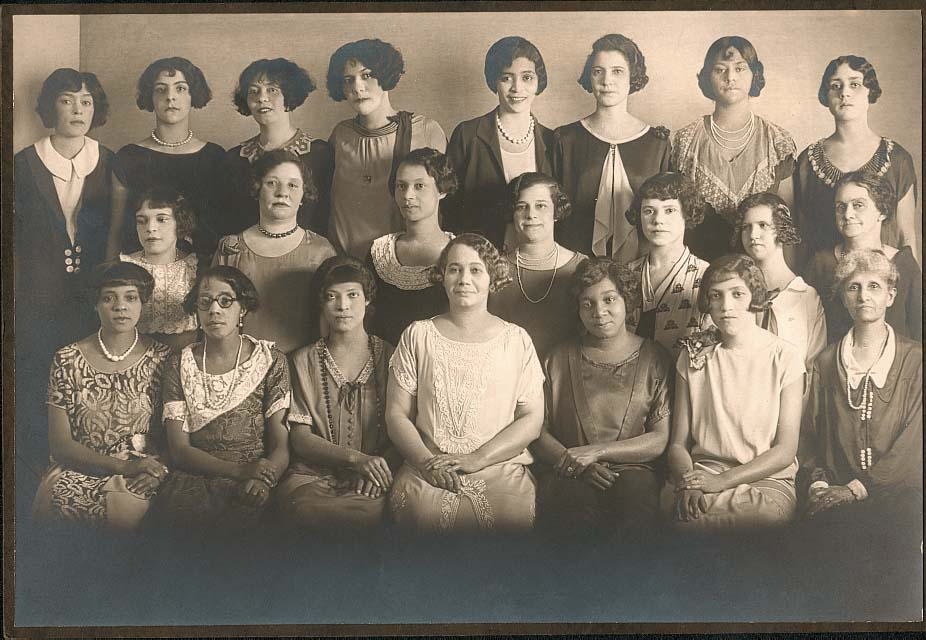
15 Nov 1980
Dear Kris and Pearl,
Figured I’d make a carbon of the stuff about the family and send you each one…this is a sort of wrap up of Grandmother….but first something the Snoopy cartoon (from Pearl) made me remember….about four blocks around the corner and down the street from Theodore was a vacant lot where for some years they had a small carnival every year…. I don’t remember the carnival at all… I never liked rides anyway… not even the merry-go-round..but I remember it being evening, dark outside…and we were on the way home….I don’t remember who was there except Daddy and I….he was carrying me because I was sleepy so I must have been very small…I remember my head on his shoulder and how it felt…the best pillow in the world…I remember how high up from the sidewalk I seemed to be…I could hardly see the familiar cracks and printings even when the lights from passing cars lighted thigs…which was fairly often because we were on Warren Ave. I remember feeling that that’s the way things were supposed to be. I hadn’t a worry in the world. I was tired, so I was carried. I was sleepy, so I slept. I must have felt like that most o my childhood because it’s still a surprise to me that life is hard. Seems that should be a temporary condition.
Now as to Grandmother and her sewing… you know how long and voluminous dresses were either side of 1900… how many stitches there were in one I hate to think… machines were available at that time but whether or not she had one I don’t know… this is what she did… she was a seamstress. Let’s say you could afford to have someone make your clothes and she was your regular person. Every July she came to your house and sewed for you and your children, making everything, including winter coats, suits, dresses, sleepwear, underwear, everything except knitted stuff like socks and hats. She might have made shirts for the man of the house too. She had no patterns. She made a pattern or just cut the material if it wasn’t complicated, basted it together, fitted it, made corrections, got it ready for final sewing. All this she did at your house, all day. When she finally went home about supper time, she took with her the things ready to be sewed and worked on them all night, because the faster she finished things the faster she got paid and the more jobs she could take. She did plain stuff if they wanted it or she could tailor a suit (easy tailoring, she always said, and she didn’t like it. Too exact, she said) Or she could make fancy like smocking, the gathery stuff across the front of little girls dresses or nightgowns or ladies fancy blouses, or embroidery or ruffles or lace trim. She could even make the lace (tat, that is), put fur collars and cuffs on coat or suit, she could do it all and she did it all all the time.
One thing she liked about her work, it was not dirty. She was not a maid of any kind. She could choose her customers to some extent, because she was good, I guess., and there were people for whom she would not work. Usually referred to as “white trash” meaning in this case I guess that they were rude to her since they could not have been poor and had a seamstress. Another thing she liked was that she could talk while she worked and she loved to talk. I remember her talking all the time when she lived with us. And Daisy was a talker too. Grandmother would talk sometimes about the folks she had sewed for. Some were Jewish. I remember only two specifics. One who advised her to cut her long hair because it would “sap her strength” and also not to take hot or long baths for the same reason the other was complaining about life and GM said (with a mouth full of pins all sticking out and her talking through them as I remember) “Well, when we get to Heaven we won’t have to worry about that any more” The lady was horrified and said “Surely, Jennie (her name was Jennie Virginia and I almost named one of you after her) you don’t think you and I will go to the same Heaven”. Grandmother always laughed at that story and said she wouldn’t mind dying so much if she would just remember that she would see that lady in Heaven and enjoy her consternation at seeing Grandmother there too with NO segregation. Mother and Daisy always shook their heads at this and said she shouldn’t talk like that about dying. Grandmother laughed some more. She liked to shock them.
